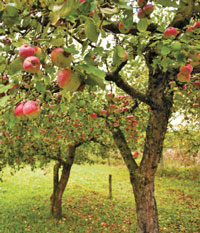Soil & Sea: reports from our producers
This article was originally published in October 2012

Prices for Washington apples are high and look to stay firm as the total North American crop is down 10 percent and packers say there won’t be enough to meet demand. Prices will be at least 10 to 20 percent above last year depending on the variety.
Organic hop acreage is on the rise due to the U.S. Department of Agriculture’s 2010 announcement that non-organic hops no longer will be allowed in organic beer as of January 2013. An estimated 10 percent of the nation’s hop farmers grow at least some organic.
Farm incomes are expected to approach all-time highs this year. Soaring prices, along with crop insurance, are insulating many farmers from the nationwide drought’s financial impact. Farmland prices nearly doubled in the past five years and land prices in key U.S. farm states continue to rise.
Farmers are assessing the damage on their crops from a hail storm that hit in late July in Sunnyside, Wash. It reportedly damaged Concord grapes and corn and left dents and bruises on apples.
This year was projected to be one of the best years on record for cattle farmers, but drought, poor pasture and a short corn crop have thrown the market into uncertainty. An estimated 55 percent of the nation’s pasture land is in poor condition.
The Alaskan Coho fishery had a disappointing summer. Catches were down from last year and the fish reportedly were smaller than usual — averaging about 5 pounds. Statewide, Coho landings were only about 1 percent of Alaska’s total salmon landings of 89 million fish. Last summer Alaska fishermen caught 3.4 million Coho. Projections for Washington and Oregon Coho landings this year were better.
Manila clam production has fallen from the peak harvest in 2006 (850 tons) to less than 500 tons in 2011. Manilas are farmed on the beaches of Puget Sound, where shellfish growers continue to battle with runoff from upland septic systems.
